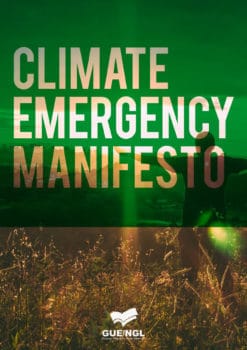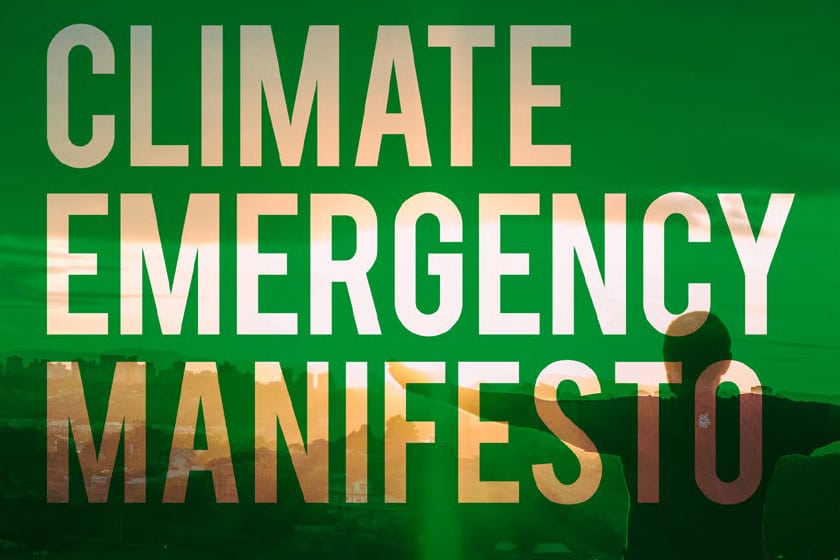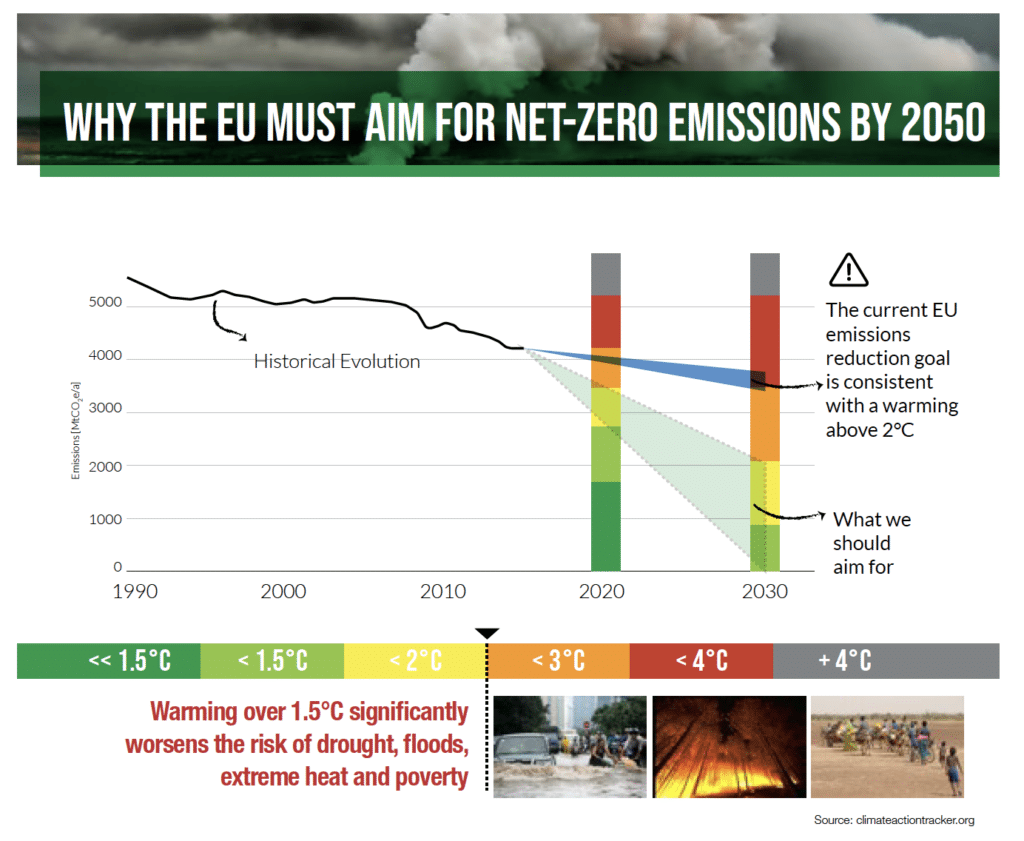Introduction
 The latest IPCC Special Report (October 2018) is our last alarm bell for stopping mass human and environmental destruction caused by human-induced climate change. Its findings were alarming-rapid, far-reaching and unprecedented changes before the year 2030 are what is required if we are to have any chance of staying well below 1.5° global warming. The failure of governments to adequately deal with this man-made crisis is already impacting millions of lives, and the most vulnerable worldwide are always hit the hardest. Short-sighted market logic has delayed an adequate response for way too long. We need unprecedented political will to achieve an ecologically just Europe, where we accept our full climate responsibility and where our climate is not sacrificed for the profit of the few.
The latest IPCC Special Report (October 2018) is our last alarm bell for stopping mass human and environmental destruction caused by human-induced climate change. Its findings were alarming-rapid, far-reaching and unprecedented changes before the year 2030 are what is required if we are to have any chance of staying well below 1.5° global warming. The failure of governments to adequately deal with this man-made crisis is already impacting millions of lives, and the most vulnerable worldwide are always hit the hardest. Short-sighted market logic has delayed an adequate response for way too long. We need unprecedented political will to achieve an ecologically just Europe, where we accept our full climate responsibility and where our climate is not sacrificed for the profit of the few.
Climate action is our number one priority in GUE/NGL. We do not see it as a stand-alone struggle; it includes struggles for decent jobs, high living standards and gender and racial equality. We oppose polices that subordinate essential natural resources of life and common goods, like water, energy, air, a clean environment and health, to the forces of profit-seeking. We fight against capitalism, neoliberal policies and corporate capture.
The panic button needs to be hit to declare climate emergency. We need serious action now; there is no more time to waste.
A legal basis for Climate Justice
The principles of climate justice are central to how we approach climate action, ensuring that the transition is fair and leaves no one behind. The struggle for climate action is deeply intertwined with all human rights struggles as well as the ecological crisis. Climate justice needs to have a legal basis and be a fundamental value in the legal systems of the EU and Member States. Only then can climate litigation succeed in ensuring our targets meet the science and are not just political compromises. Only then, can all policy work towards strong and ambitious climate goals, through the prism of climate justice.
- Insert climate justice into the legal bases of the EU and Member States and ensure climate policies follow the principles of climate justice
- Ensure just transition is at the heart of climate action, alleviate energy poverty, guarantee the right to equal access to energy and stop policies that burden vulnerable and marginalised people
- Ensure a long-term vision and road map to achieve all Sustainable Development Goals (SDGs) and use the SDGs as essential benchmarks for all legislative actions in every policy field, acknowledging that climate goals are related to all other SDGs
- Give people, especially the youth, a voice in our climate policies and prioritise inclusive climate education
- Gender proof our climate mitigation and adaptation policies and create gender-sensitive and inclusive climate policies
- Revise the EU 2050 long-term carbon-neutral strategy to focus on climate justice, 100% renewables and early action to reach carbon neutrality by 2040 at the latest
An End to Fossil Fuels
 A rapid and clear expiry date for fossil fuels is urgently needed to keep global warming well below 1.5°C. We believe in a right to energy, and this becomes a right to renewable energy when considering the human right to live in a safe and habitable environment. Instead of continuing to allow the fossil industry to set the agenda, we need command and control policies at EU and Member State levels. Our only chance lies in a sustainable, decentralised and accessible energy supply, which provides jobs and guarantees our energy sovereignty. We cannot afford to be shy in investing in this renewable future.
A rapid and clear expiry date for fossil fuels is urgently needed to keep global warming well below 1.5°C. We believe in a right to energy, and this becomes a right to renewable energy when considering the human right to live in a safe and habitable environment. Instead of continuing to allow the fossil industry to set the agenda, we need command and control policies at EU and Member State levels. Our only chance lies in a sustainable, decentralised and accessible energy supply, which provides jobs and guarantees our energy sovereignty. We cannot afford to be shy in investing in this renewable future.
- Immediately revise of our 2030 targets to commit to a reduction target of at least 65% of greenhouse gases, and revise all other climate and energy targets to what is scientifically necessary to curb global warming well below 1.5°C
- Commit to a fossil fuel phase out date, which includes gas, by 2030 and a rapid phase out nuclear energy and first generation biofuels, including palm oil and soy, as well as excluding the fossil fuel industry completely from all decision-making processes
- Move away from false ‘solutions’, gas and nuclear reliance and start realising the potential of natural carbon sinks, reject geoengineering and techno-fixes, such as carbon-capture and storage, which facilitate dirty industries
- Increase investment in renewable energy, energy efficiency and energy savings in all sectors
- Enshrine the right to renewable energy, so that energy that does not harm our planet is accessible and affordable to all
Resist the Constant Growth Model
 Global capitalism dictates constant growth, and all growth is reliant on natural resources, which are, of course, limited. Ending the constant growth model is a big task, and so immediately, measures must be taken to counteract the constant growth model. This means regulating to ensure sustainable production and sustainable systems all around us and fight for new economic and social policies. Allowing GDP to be the sacred indicator of social progress is ignorant of the ecocide this unregulated growth creates. All sectors, as obliged by the Paris Agreement, must decarbonise. To do this, we need new production models that fully incorporate the polluter pays and circular economy principles and resist the harmful unsustainable forces of global capitalism.
Global capitalism dictates constant growth, and all growth is reliant on natural resources, which are, of course, limited. Ending the constant growth model is a big task, and so immediately, measures must be taken to counteract the constant growth model. This means regulating to ensure sustainable production and sustainable systems all around us and fight for new economic and social policies. Allowing GDP to be the sacred indicator of social progress is ignorant of the ecocide this unregulated growth creates. All sectors, as obliged by the Paris Agreement, must decarbonise. To do this, we need new production models that fully incorporate the polluter pays and circular economy principles and resist the harmful unsustainable forces of global capitalism.
- Implement a European green rule: privilege environment and climate over the free market, end the quest for profit and rethink the functioning of our society according to ecosystem’s limits
- Rapidly shift to sustainable agriculture and fisheries, including shorter supply chains, full environmental compliance and food sovereignty. This means a swift move away from the current agro-industrial intensification model, including the patenting elements of life, towards ecological, sustainable farming and fishing practices and local, sustainable food systems that promote genetic diversity
- Completely transform the direction on the EU’s trade, commercial and investment policies, ensuring only environmentally and socially sustainable trade and investments. This means no trade without ratification and implementation of the Paris Agreement, including climate and environment clauses in trade deals, and proper regulation of the climate impact of imports and exports
- Ensure that the true meaning of circular economy principles are fully implemented in all legislation and processes; promote local consumption and production based on these principles of reuse, recycle and repair to stop planned obsolescence business strategies; adapt consumption to the limits of the Planet
- Properly fund social services and increase smart and green spatial and urban planning and ensure accessibility, social justice and equity in the allocation of public services. radically rethink transport, focusing on zero-emission public transport which should be free for all and promote active mobility
- Protect and invest in our biodiversity and carbon sinks, by prioritising sufficient funding for the conservation and restoration of woodlands, peatlands and other habitats, particularly protecting native species; adopt control and surveillance measures on a European scale for the pests and pathogens that are decimating European forests and create specific support measures to prevent and fight forest fires
Direct the Transition
Market ‘solutions’, such as carbon markets, have been successfully pushed for by industry to become the prevalent logic in the EU. Market approaches are inherently incapable of effectively reducing emissions and have led us to the standstill where we are now. They create hands-off, ‘cost-effective’, fake responses to climate change, completely shirking governments of the responsibility to direct the rapid transition to a sustainable society. Carbon credits are a right to pollute, and we utterly reject this concept. Dirty industries must be directly regulated and renewables massively endorsed. The polluter pays principle must apply, the costs cannot be externalised to society and the environment. This means that the companies that extract and sell fossil fuels must pay up, as well as the big polluting industries. Nature, biodiversity and a habitable planet are not commodities that require cost-benefit analyses, their value cannot be monetised, nor can it be ignored.
- End the liberalisation agenda of the EU for energy, recognise it is as a common good and promote the socialisation of the energy sector; allow for massive state investment into public renewable energy
- Democratise and decentralise energy and ensure an expansion in community-level energy projects
- Reject all market-based climate policies because they are climate delaying tactics; stand for goal-based direct regulation on greenhouse gas emissions by directly setting and monitoring legally binding emissions reduction goals for each sector
- Stop reforming the broken market system and immediately abolish the EU Emissions Trading System (EU ETS)
- Democratise and decentralise energy and ensure an expansion in community-level energy projects
- Introduce binding regulations on emissions for shipping and aviation—offsetting schemes such as CORSIA cannot be considered as climate action; directly regulate shipping and aviation in climate policies by mandating emissions reduction goals and emissions performance standards; ensure public investment into alternative sustainable fuels for both and ensure that these industries are properly taxed
- Encourage Member States to green their tax systems making sure that the big polluters pay their share, not the people. Regulate financial markets so that financial actors comply with strict sustainability and social criteria that works towards the necessary transitions
Investment Not Austerity
 Climate action needs to be about public investment, not austerity. We reject the neoliberal notions of leaving climate action up to individuals; we place the responsibility firmly on governments and lawmakers, to lead with public investment and ensure that the private sector can only invest sustainably. Climate justice means the burdens and benefits of action must be distributed fairly. People cannot be left picking up the tab to the advantage of the Big Polluters. Ambitious climate action must mean a Just Transition, a framework of social interventions to make sure that no communities or regions are left behind in the transition to a clean planet. A massive mobilisation of funds is needed for the green transition, including its direct and indirect consequences.
Climate action needs to be about public investment, not austerity. We reject the neoliberal notions of leaving climate action up to individuals; we place the responsibility firmly on governments and lawmakers, to lead with public investment and ensure that the private sector can only invest sustainably. Climate justice means the burdens and benefits of action must be distributed fairly. People cannot be left picking up the tab to the advantage of the Big Polluters. Ambitious climate action must mean a Just Transition, a framework of social interventions to make sure that no communities or regions are left behind in the transition to a clean planet. A massive mobilisation of funds is needed for the green transition, including its direct and indirect consequences.
- Establish a Just Transition Fund and ensure decent green jobs are created in vulnerable regions particularly; ensure that no community or region suffers disproportionately from the transition to a clean planet
- Revise how Europe spends its funds, take account of the Ecological deficit we create and ensure a massive public Green Investment Plan
- End all direct and indirect subsidies to the fossil fuel industry, including quantitative easing at the European Central Bank
- Ensure public interest research and development on environmentally-friendly low-carbon technologies and introduce the adequate incentives
Ambitious Global Action
Climate action needs to take place at the global level too, with an ambitious and coordinated global response. Those who contribute the least to climate change, are the ones who suffer the most from its consequences. This is why it is essential that the EU and Member States act on their historic responsibility in emitting greenhouse gases and take full account of their financial and technological resources. We must do more and reach low carbon neutrality by 2040 at the latest whilst helping adaptation efforts. Climate justice at the international level should be based on effective partnerships and international solidarity. The Commission and the Council negotiate about climate on behalf of all EU Member States, but Member States need to become more active and involved at the international level and loudly advocate the principles of climate justice.
- Take responsibility for our historical share in global warming; compensate for the climate debt we have built up and ensure the most vulnerable countries are sufficiently resourced to adapt to global warming and rising sea levels
- Limit our global ecological footprint to help protect our oceans and forests worldwide, and support measures to protect and recover these lungs of the earth
- Call for a legal, universal definition of climate refugees, ensure that there are safe and legal ways to the EU and that their right to asylum is respected in every Member State. Call for a legal and universal definition of internally displaced people due to climatic reasons, ensuring that our foreign policies are oriented towards protecting their rights.
- Secure equitable and sufficient flows of climate finance under the Paris agreement and ensure grants are the financial instrument favoured over loans. Ensure that the Green Fund is replenished to €100 billion
- Ensure that all development and trade policies include, and are streamlined with, climate goals, and ensure a readily available funding mechanism for Loss and Damage
- Advocate for an International Convention on Fossil Fuels to keep them in the ground
- Oblige the European Union and all its Member State to act with high ambition at international climate conferences, play a more active role in the yearly global summit, and act on the COP conclusions every year and; that Member State and EU use their climate diplomacy to spur other global actors to pursue adequate decarbonisation strategies
Together we Fight for Change
As one of the richest continents and main contributors to climate change, Europe has a duty to ensure rapid reductions in greenhouse gas emissions. We are in dire need of just and sustainable structural reforms throughout society—bearing in mind the historical responsibility of the rich, big polluters. Making capitalism just a bit greener will not succeed in halting climate change, it will only delay climate action further. To date, dirty industries have been influencing our climate policies. Now we need our climate action to be accountable to the people, not the climate confusers. We need to place people and the sustainability of the environment above profit. If we do not implement radical system changes right now, the commercialisation of the earth will continue to put the interests of the multinational companies first. This puts our planet and ourselves atan unacceptable risk. We have a responsibility to avert the climate crisis with urgency and preserve the earth for future generations. The only effective response is to immediately address this crisis as a climate emergency. Together we can change the system to save the climate!



